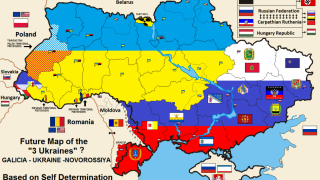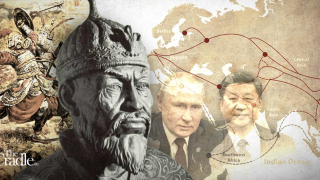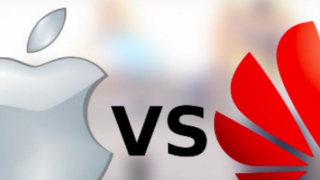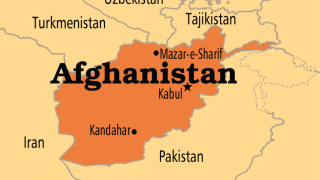Pompeo Attempts To Create New Allies In Eurasia Against Russia
08.02.2020
Days ago, U.S. Secretary of State Mike Pompeo completed a three-day tour of Ukraine, Belarus, Kazakhstan and Uzbekistan. At the conclusion of the tour he proudly proclaimed that Moscow will no longer influence the post-Soviet world alone.
In Ukraine, Pompeo had talks with President Vladimir Zelensky, Foreign Minister Vadim Pristiko and Defense Minister Andrei Zagorodnuk. Zelensky showed indirect solidarity to U.S. President Donald Trump by announcing that relations between the two countries had not been damaged with the impeachment attempts, but rather had improved. Zelensky urged American business to invest in Ukrainian infrastructure and to develop the Black Sea shelf in order to establish a footing of friendship, while Pompeo encouraged the Ukrainian president to visit Washington.
“There is no condition for President Zelensky to come to Washington. We’ll find the right time or find the appropriate opportunity,” Pompeo said.
The Ukrainian president in response said he would go to the U.S. if the parties could agree on “something beneficial.” “I do not want to become a political traveller like my predecessors,” explained Zelensky.
The main intrigue of the meeting was Washington's reaction to the Ukrainian president's proposal to involve the U.S. in crisis resolution in Donbass. Pompeo assured Zelensky that Washington are closely following the negotiations on the Donbass issue and do not plan to abandon sanctions against Russia, emphasizing that the U.S. will never recognize Crimea as Russian territory.
Pompeo effectively demonstrated that the White House highly values its relations Ukraine.
The Secretary of State continued his tour by arriving in Belarus where he did not hold back mending relations with Minsk.
“We are not talking about a choice between us and them (Russia). We are talking about diplomatic relations,” Pompeo said.
He then announced that the U.S. ambassador would return to Minsk soon which had been vacant since 2008 when Belarussian President Alexander Lukashenko withdrew Belarus’ ambassador from Washington because of Western sanctions. Lukashenko began his conversation with Pompeo with words of gratitude.
“It is good that you took the risk of coming to Minsk and seeing how the people here are,” Lukashenko said while explaining how the Belarusian “dictatorship” is different.
Improvements in U.S.-Belarus relations will not be limited to resuming embassies. Pompeo made it clear that it allowed the lifting of sanctions against the country, but linked it to an improvement in human rights. He also touched on economic cooperation.
The head of the State Department also drew attention to the problem of energy supply - he said the White House was following Minsk's talks with Russian suppliers on gas prices.
“The United States wants to help Belarus build its own sovereign country,” Pompeo said at a joint news conference with Foreign Minister Vladimir Makei. “Our energy producers stand ready to deliver 100% of the oil you need at competitive prices. We’re the biggest energy producer in the world and all you have to do is call us.”
Lukashenko assured an American official that Belarus's sovereignty was unquestionable and that he had “found understanding” with Washington in a number of areas, demonstrating that Pompeo's visit took Minsk-Washington relations to a new level. Lukashenko is trying to strike a balance with the West. However, there is no talk of a reorientation of Belarus’ position.
The U.S. Secretary of State then visited Uzbekistan, demonstrating Washington’s renewed interest in Central Asia, and not because of Afghanistan. It is expected that in the near future the U.S. will release a new strategy for Central Asia that emphasizes on cooperation with the region, especially in security issues but also energy.
In Kazakhstan, after a meeting with President Kassym-Jomart Tokayev, the U.S. called on local businesses to extend their friendship as Pompei claimed that he is "convinced that cooperation with the United States will give the best result for any state.”
Pompeo's visit with the Kazakh leadership politically strengthened the transition of power in Kazakhstan and fully legitimized the country's new president. It also opened new opportunities for the U.S. to access the resource rich country.
Uzbek President Shavkat Mirziyoyev has been in power for almost as long as Trump and is credited for bringing critical reforms to his country. Pompeo also expressed support for all the reforms in Uzbekistan and the expansion of relations with the Washington. He however pushed for Tashkent to reconsider becoming an observer for the Eurasian Economic Union and suggested that they rather pursue membership for the World Trade Organization. Although the U.S. understands that cooperation with Russia and China will remain a priority for Central Asia, the U.S. want greater influence in the region, particularly Kazakhstan and Uzbekistan, two countries wedged between Russian and Chinese influence.
Although Pompeo achieved great expansions in U.S. relations with the four aforementioned countries, with the exception of Ukraine, it is unlikely that Washington will dismantle Russia in its traditional zone of influence. There can be little doubt that although trade and energy issues were considered, Pompeo is attempting to weaken Russian influence as part of Washington’s wider strategy of constant pressure against the Eurasian Giant. However, the U.S. is to far removed from Central Asia to truly become the dominant influencer in the region.












